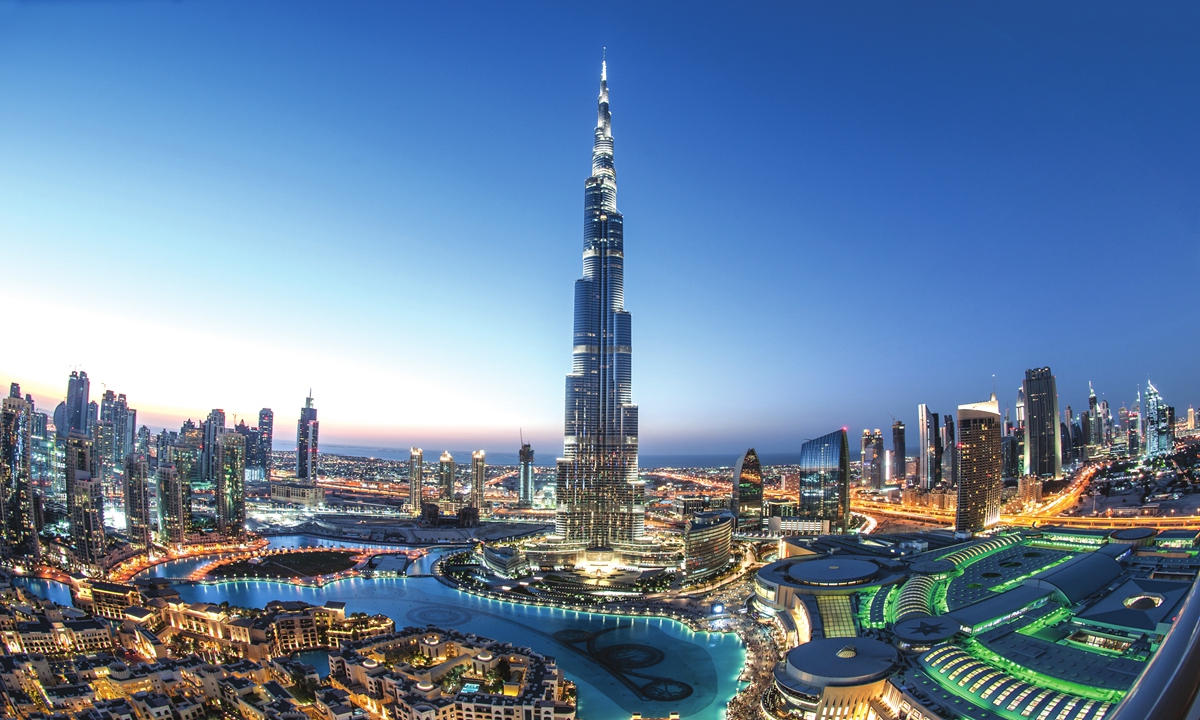
The Burj Khalifa in Dubai, United Arab Emirates. Photo: VCG
Editor's Note: For Chinese people, the past decade has been epic and inspirational. The country, under the leadership of the Communist Party of China (CPC) Central Committee with Comrade Xi Jinping at the core, has made great endeavors in boosting its economy, deepening reforms, improving the rights of its people and acting as a responsible global power.
How does the Arab world view China's development? What has China-proposed Belt and Road Initiative brought to the Arab countries? Ebrahim Hashem (
Hashem), former adviser to the chairman of the Abu Dhabi Executive Office, an authority responsible for Abu Dhabi's long-term strategies, and Asia Global fellow at the Asia Global Institute at the University of Hong Kong, shared his views with Global Times (
GT) reporter Yu Jincui.
This is the 22nd article of the Global Times series about this special decade.
GT: What has impressed you the most regarding China's development over the past 10 years? Why do you think China has succeeded in achieving these accomplishments?
Hashem: Over the last 10 years, China has made major achievements and important strides on the global stage. It has become the largest economy, in purchasing power parity (PPP) terms, the biggest trading nation and the greatest manufacturing hub in the world. It has introduced the gigantic Belt and Road Initiative (BRI), including over 140 countries, and the Asian Infrastructure Investment Bank (AIIB) with capital contributions of $ 100 billion and members from various regions of the world. Since 2012, China has become more visible in all regions of the world.
Scientifically, China has been the top filer of Patent Cooperation Treaty (PCT) applications over the last three years. In 2022, it has been ranked the first in the world both in terms of scientific research papers and most cited papers. Recently, the Chinese space exploration team made a number of breakthroughs by analyzing lunar samples retrieved by the Chang'e-5 robotic mission, showcasing China's exponentially growing space exploration capabilities.
In my opinion, the reliable, trusted, and competent leadership of the Communist Party of China (CPC) is one of the main success factors in China's achievements. Since it won the Chinese civil war in 1949, the CPC has protected the Chinese nation from internal and external threats, ensuring social cohesion, unity, and prosperity.
Ancient Chinese philosophy is concretely rooted in the Chinese leadership with heavy emphasis on improving people's lives, placing ethical behavior in society above personal material gain, providing inspirational role models and promoting equality.
Another factor in China's success is the clarity of vision and mission through the "Two Centenary Goals" by years 2021 and 2049, giving the 1.4 billion Chinese a clear sense of direction and purpose.
The ancient and deep Chinese civilization has given its people enough self-confidence to pursue their own development path of socialism with Chinese characteristics, avoiding the trap of using foreign straitjacket models that do not fit their local conditions.
GT: You said Arabs and Chinese have sympathy for each other. How will this help build a China-Arab community with a shared future? How do you see the prospect of a China-Arab community with a shared future?
Hashem: Arab-China relations go back to ancient times. More than two thousand years ago, the ancient Silk Road connected the Arabs and Chinese. The relations between the two sides have been one of cooperation, openness and inclusiveness, mutual learning, and benefit. The Arabs and Muslims know and admire the story of Zheng He, China's Muslim navigator in the Ming Dynasty, who travelled to Jeddah, Mecca and Medina in the 15th century.
The Arabs and Chinese are people of trade; they've been trading with each other for thousands of years. As traders, it's natural and imperative for them and for their successors to build trust and win-win relations. It's no wonder China is currently the largest trade partner of Arabs.
History plays an important role in Arab-China relations. Both are acutely aware of their glorious histories and recent betrayal and humiliation by the West, enabling them to sympathize with each other. Both understand the causes of their humiliation, and work to eliminate them.
China was humiliated between 1840 and 1949; it finally prevailed. This bitter taste of more than a century of humiliation enables the history-aware Chinese to sympathize with those who are recently going through their own feeling of humiliation, including many parts of the Arab and Muslim worlds.
As a result of their friendly history and the deep reservoir of goodwill between the two sides, the Arabs and Chinese have been able to build trust and rapidly strengthen their relations. Arab and Chinese leaders take a long view of their relations, believing that their relations have so much strategic synergy and complementarity, and great growth potential. This is one main reason there is a drive for a strategic high-level coordination of national plans between the two sides.
This is also one reason some important Arab nations signed up to become founding members of the Asian Infrastructure Investment Bank (AIIB). That is also a major part of the reason China has upgraded its bilateral relations with Arabs' three largest economies, Saudi Arabia, the UAE and Egypt, to the level of a comprehensive strategic partnership.
The Arab-China relations are becoming institutionalized and cemented through strategic long-term deals in critical sectors such as energy and telecommunications. There is no question that the prospects of the Arab-China relations are enormous and brilliant. China and its people are highly respected and appreciated by the Arab world's people and governments.
The region hopes to see China continue its huge development success, because the Arab people and leaders view China's success as the Arab world's success, literally. The Arab-China relations have been growing exponentially; they have so much potential to grow further in the future, especially when the regional and global geopolitical situation stabilizes. Many observers hope and expect that the current trajectory of Arab-China relations will continue, accelerating the re-establishment the old Silk Road and introducing a new golden era of Arab-China relations.

Ebrahim Hashem. Photo: Courtesy of Hashem
GT: With the Belt and Road Initiative being recognized by more and more countries, ties between China and Middle East countries have grown closer. How has the Belt and Road Initiative influenced Middle East countries?
Hashem: Although there have been claims and warnings that the BRI projects are "debt traps," Arab states have enthusiastically embraced the BRI. Since its announcement by the Chinese President in 2013, the Arab nations have warmly welcomed, promoted, and pledged financial contribution to the initiative.
The Chinese development success story has been a source of inspiration to many Arab people and states. There is so much synergy between the two sides, making them natural partners in many areas, ranging from energy to infrastructure.
The BRI is an excellent opportunity for the Arabs to achieve the strategic goals of their national development plans. Many Arab states are trying to boost economic and fiscal revenue diversification and job creation, establish logistics hubs and financial centers, and develop technological capabilities. These goals nicely complement the goals of China's BRI.
The UAE is a partner in building the BRI. The plans under the initiative's framework are aligned with our vision. The UAE's advanced infrastructure, logistics capabilities, and its long-standing position as a trade hub adds to the momentum of the BRI. We look forward to cooperating with all stakeholders to make sure this remarkable global project is a success.
Arab-China relations are based on the "1+2+3" cooperation framework. Energy is the core; infrastructure and trade and investment are the two wings, and technologies in sectors such as nuclear energy, space satellite and new energy are the three breakthroughs.
GT: You said "to have an effective multipolar world, the international system should be adjusted to represent interests of multiple players." What role do you think China and China-proposed initiatives can play in promoting an effective multipolar world?
Hashem: Today, we are no longer living in a unipolar world. In fact, we have bypassed the bipolar world and moved right into the multipolar world. However, the global governance structure is still not reflective of this reality. If we examine the permanent seats at the UN's Security Council, voting power at the IMF and World Bank, we realize the structure is archaic from the post-WWII world.
Post-WWII and post-Cold War world governance architecture has outlived its shelf life; it's only a matter of time before it's officially and institutionally replaced with an order that is equitable, inclusive, and multipolar.
The multipolarity is already a fact on the ground. If we analyze the global challenges such as climate change, energy transition, terrorism, food and energy security, we find many nations/blocs are exploring ideas about how to tackle them - no one single nation or bloc of nations can solve all those challenges. The power distribution is no longer concentrated in the US or Europe alone - as was the case post-WWII, it's now also in China, India, Russia, Africa, Arab world, and Latin America in addition to the US and Europe.
Moving to a multipolar world, with returning and rising power centers such as China, India, Russia, Indonesia and Egypt taking their natural place in global system is an organic progression of human civilization. This progression is inevitable; it will happen, sooner or later, and it's unwise to resist it.
Chinese-led initiatives such as BRI, AIIB, Silk Road Fund and New Development Bank (NDB) have contributed enormously to the process of world system multi-polarization. Countries, especially developing ones, do not need to stick to the Bretton Woods institutions, which are under the disproportionate influence of the US and its allies, if they don't like the terms of their deals. Because these post-WWII organizations have become politically difficult to reform, these new initiatives and institutions are creating a steadily expanding system in parallel. The funds offered by those organizations in many cases outcompete those offered by the IMF and the World Bank.
More recently, the Global Development Initiative and Global Security Initiative are positive contributions by China that can accelerate the multi-polarization process of the world system. Also, the innovative BRICS+ structure has started to attract attention; many observers view it as a potential nucleus for the new multipolar world that's emerging. It can remain dynamic and adaptable to respond to new changes as the world transitions into its next phase of development. Many Arab countries view BRICS+ positively, hoping to contribute to and benefit from it.
China's initiatives in the financial sector are also positive. A less dominant US dollar and a more balanced and multipolar international monetary system means a more stable global economy. Therefore, China's initiatives in relation with digital currencies are positive.
Bai Qinling contributed to this article.





